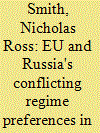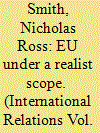|
|
|
Sort Order |
|
|
|
Items / Page
|
|
|
|
|
|
|
| Srl | Item |
| 1 |
ID:
167776


|
|
|
|
|
| Summary/Abstract |
Russia, under the stewardship of Vladimir Putin, has arguably taken a number of steps to try and secure a position as a pole in an emerging multipolar world. One step has been to modernize its military and reassert itself globally (evident in its Syria action), while another step has been to try and hasten the decline of the United States (evident in its BRICS cheerleading). It is argued that the latter step is particularly difficult to achieve because the United States still has a significant power advantage over the rest.
|
|
|
|
|
|
|
|
|
|
|
|
|
|
|
|
| 2 |
ID:
174741


|
|
|
|
|
| Summary/Abstract |
This article considers the potential for the COVID-19 pandemic to represent an epochal moment in international politics, one which China can use as a window to maximize its international order-building efforts. It is argued that China’s putative international order-building efforts to date have faltered, in part, due to an inability to create meaningful friendships with prominent international powers. However, the COVID-19 pandemic allows China to play a key humanitarian role in heavily afflicted countries and, through this, perhaps an opportunity to forge more meaningful friendships. It is argued that China is trying to attach its concept of friendship to its humanitarian assistance while also stepping into the clear international leadership void that exists at the moment. This is not without faults or missteps, but the lasting impact could be significant for international politics and the global order.
|
|
|
|
|
|
|
|
|
|
|
|
|
|
|
|
| 3 |
ID:
141444


|
|
|
|
|
| Summary/Abstract |
This paper evaluates the competitiveness of the European Union (EU) and Russia's regime preferences in their foreign policies towards Ukraine in the scope of the on-going Ukraine crisis. It is argued that the underpinning geopolitical environment Ukraine currently resides in, wedged between two much larger powers (the EU and Russia), renders it a vulnerable target state for regime promotion from both sides. Indeed, since the 2004 Orange revolution in Ukraine, both the EU and Russia have had discernible regime promotion strategies in their foreign policies. The EU's regime promotion has focussed on facilitating democracy in Ukraine, along with more material interests (trade and strategic aims) while Russia has reacted with increasingly zero-sum policies which pursue its preference for having a loyal and Russian-facing regime in Ukraine. Ultimately, the increasing competitiveness of the EU and Russia has been a key factor in the onset of the Ukraine crisis, which offers important insight into the relationship between large powers and the smaller third states which lie in their overlapping spheres of influence.
|
|
|
|
|
|
|
|
|
|
|
|
|
|
|
|
| 4 |
ID:
144077


|
|
|
|
|
| Summary/Abstract |
This article breaks from the dominant liberal-idealist literature and examines the European Union’s (EU) foreign policy decisions from a realist perspective. Through employing a novel, EU-focussed neoclassical realist framework, the EU’s offer of a Deep and Comprehensive Free Trade Agreement (DCFTA) to Ukraine is argued as being a result of the mediating influence of its normative power role identity, the (mis)perceptions held by its foreign policy decision-makers and the institutional constraints inherent to its foreign policy decision-making process, which filtered systemic pressures (emanating from the European geopolitical setting) into the final foreign policy decision. Thereafter, this article assesses the EU’s responses to the Ukraine crisis, offering policy reflections and recommendations.
|
|
|
|
|
|
|
|
|
|
|
|
|
|
|
|
| 5 |
ID:
188359


|
|
|
|
|
| Summary/Abstract |
Since at least the last decade, New Zealand has been employing something of an asymmetrical alignment hedge of the US and China, aligning itself with the US strategically and with China economically. Such a strategy remains the perceived optimal foreign policy in Wellington. However, as Sino-American relations continue to deteriorate and the Indo-Pacific super-region becomes more geopolitically tense, the room for hedging is shrinking, making New Zealand’s putative strategy potentially untenable. This article assesses the changing geopolitical situation New Zealand finds itself in and assesses other potential strategic options– namely, non-alignment, balance or bandwagon, and zigzagging.
|
|
|
|
|
|
|
|
|
|
|
|
|
|
|
|
| 6 |
ID:
191745


|
|
|
|
|
| Summary/Abstract |
In 2021, Aotearoa New Zealand's Foreign Minister, Nanaia Mahuta, sketched out a kaupapa Māori (collective Māori vision) foreign policy for New Zealand based on four tikanga Māori (Māori customary practices and behaviours): manaakitanga (hospitality), whanaungatanga (connectedness), mahi tahi and kotahitanga (unity through collaboration), and kaitiakitanga (guardianship and the protection of intergenerational wellbeing). This article makes a novel contribution to the global International Relations body of literature by questioning to what extent New Zealand's ‘Māori foreign policy’ has been applied to its relationship with China. Through assessing the communications of Mahuta and other officials, it is found that New Zealand is utilizing a kaupapa Māori framework towards China: ‘the taniwha and the dragon’. It is argued that New Zealand is attempting to consolidate the maturity of the Sino-New Zealand relationship, as well as differentiate itself from the other Anglosphere countries that have recently pushed back on China. In doing so, not only is New Zealand something of an outlier, it is demonstrating how eschewing a western-centric understanding of foreign policy for a more relational view based on indigenous knowledge and perspectives (in this case, from te ao Māori: the Māori worldview) can be applied at a time of increasing great power competition.
|
|
|
|
|
|
|
|
|
|
|
|
|
|
|
|
| 7 |
ID:
155274


|
|
|
|
|
| Summary/Abstract |
Russia’s foreign policy decisions towards Ukraine in the context of the “Ukraine crisis” have been portrayed largely in a negative light which crudely paints Russia’s actions as being imperialistic, evil and largely irrational. This article argues that by looking at the interplay of identity and perceptions at the foreign policymaking level, Russia’s actions in Ukraine can be, to some degree, rationalized. First, Russia’s Eurasian–oriented great power role identity and its perceptions of Ukraine as represent a vital national interest. Second, the European Union and the United States are perceived as embodying a Western team of anti-Russian imperialists, which led Moscow to pursue hazardous foreign policies.
|
|
|
|
|
|
|
|
|
|
|
|
|
|
|
|
|
|
|
|
|